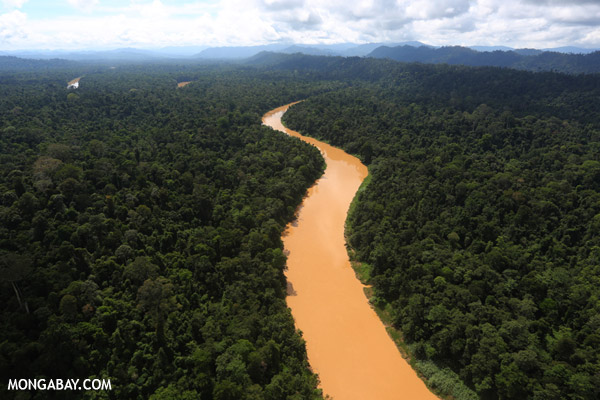
Carbon credits generated by forest conservation activities in tropical countries could play a role in California’s cap-and-trade program, helping mitigate climate change and providing benefits to local communities, said a panel of experts on Friday.
The panel, known as the REDD+ Offset Working Group, issued a set of draft recommendations on how the states of Acre in Brazil and Chiapas in Mexico could link efforts to reduce deforestation with the State of California’s new cap-and-trade system. The recommendations come after two years of analysis and consultation.
“These recommendations are a pathway for states and provinces to provide leadership in reducing deforestation and reducing GHGs while benefitting local communities,” said panel member Dan Nepstad, a noted Amazon researcher with the Amazon Institute of Environmental Research or IPAM. “We think these recommendations continue California’s leadership role in global climate policy”.
The recommendations focus on three areas — program architecture, social and environmental safeguards, and legal and institutional issues — according to a statement released by the panel:
- Program Architecture: including the scope of eligible REDD+ activities, reference levels and additionality, crediting pathways, registry infrastructure, state-level accounting, and systems for measurement monitoring, reporting, and verification;
- Social and environmental safeguards: to ensure communities and the environment benefit from any offset program; and
- Legal and institutional issues associated with efforts to link GHG reduction efforts in subnational jurisdictions in foreign countries.
“The issues we tackled in this report are meant to provide clear guidance in creating quality jurisdictional programs that are ready for linkage with California today,” said panel member Gregory Asner, a researcher Stanford University who has pioneered advanced systems for monitoring deforestation and forest degradation. “We believe the mix of these recommendations with the current technology available to monitor, track and report deforestation around the globe are a recipe for success.”
The draft recommendations are now open to comment, according to the panel, which is launching a series of three workshops to collect feedback.
Once finalized this summer, the recommendations will be sent to the governors of California, Aceh, and Chiapas, where they are expected to play a role in advancing the acceptance of compliance-grade REDD+ carbon credits in California’s cap-and-trade system. The recommendations would likely underpin future agreements with other sub-national entities that are part of the Governor’s Climate Forests Task Force (GCF), an initiative that brings together 19 states and provinces from Brazil, Indonesia, Mexico, Nigeria, Peru, Spain, and the United States to develop a framework for REDD+ programs at sub-national levels.
The GCF initiative is broadly viewed as a test case for the inclusion of forest-based carbon offsets in regulatory frameworks for reducing greenhouse gas emissions. As such, the GCF has been a lightning rod for criticism of REDD+ and carbon offsets. Opponents of REDD+ say a poorly designed mechanism could fail to reduce carbon emissions, while undermining the rights of forest-dependent people and increasing the risk of land conflict. A report published by Greenpeace last year highlighted some of these concerns specifically in the context of the GCF process.
For its part, the REDD+ Offset Working Group says its recommendations are designed to mitigate these risks. The panel includes a range of scientists, policy experts, and conservationists.
Related articles
Commentary: Protecting the people, not the polluters, says Greenpeace
(09/27/2012) Greenpeace is dedicated to ending deforestation and preventing catastrophic climate change. We are often recognized for putting our lives and freedoms on the line to accomplish these goals. In the U.S. alone, Greenpeace is campaigning to save ancient forests, speaking out against the coal industry; mobilizing millions to save the arctic from new oil drilling; and pushing key industries to commit to renewable energy.
Commentary: Greenpeace report threatens climate change mitigation and tropical forests
(09/25/2012) From 2008 through 2010, deforestation in the states of the Brazilian Amazon declined steeply, lowering reductions in CO2 emissions to the atmosphere by approximately 1.5 billion tons. During this same period, the 30 nations that participate in the world’s largest carbon market—the European Union’s “Emissions Trading Scheme” (EU ETS)—reduced emissions by about 1.9 billion tons (Figure 1). There is an important difference between these two extremely important steps towards emissions reductions. The first was achieved through climate-related donations of approximately US$ 0.47 billion. The second involved financial transactions of US$ 411 billion—roughly 875 times more money. Greenpeace’s new report , Outsourcing Hot Air, could help to slow—or reverse—the progress of tropical states and provinces around the world in reducing emissions from deforestation and forest degradation (REDD).
Greenpeace targets forest carbon offsets in California’s cap-and-trade
(09/25/2012) California’s inclusion of forest conservation-based carbon offsets in its climate change legislation may not lead to net reductions in greenhouse gas emissions and could exacerbate social conflict in places like southern Mexico, argues a report released Monday by Greenpeace. But the activist group faced sharp criticism from backers of California’s initiative.
Experts: sustainable logging in rainforests impossible

(07/19/2012) Industrial logging in primary tropical forests that is both sustainable and profitable is impossible, argues a new study in Bioscience, which finds that the ecology of tropical hardwoods makes logging with truly sustainable practices not only impractical, but completely unprofitable. Given this, the researchers recommend industrial logging subsidies be dropped from the UN’s Reducing Emissions from Deforestation and Forest Degradation (REDD+) program. The study, which adds to the growing debate about the role of logging in tropical forests, counters recent research making the case that well-managed logging in old-growth rainforests could provide a “middle way” between conservation and outright conversion of forests to monocultures or pasture.
Conservation areas failing to protect forests better than logging concessions in Sumatra
(06/28/2012) Areas zoned for conservation suffered deforestation rates similar to logging concessions in Sumatra between 1990 and 2000, but maintained forest cover more effectively than lands allocated for agricultural conversion, reports a study published in Conservation Letters.
Rainforests need massive finance, but REDD must be well-designed to succeed

(01/17/2012) A proposed mechanism to reduce greenhouse gas emissions by protecting tropical forests has evolved considerably since it started to gain momentum during the 2005 climate talks in Montreal. Known then as ‘avoided deforestation’, the concept was simple: pay tropical forest countries to keep their forests standing. Since then, the concept has broadened to include activities beyond strict forest conservation, including reducing logging and fire, protecting carbon-dense peatlands, encouraging better forest management practices in existing forest concessions, and promoting reforestation and afforestation. A prominent voice in the discussion around REDD since its inception is the environmental activist group Greenpeace. Mongabay recently caught up with Roman Czebiniak, Greenpeace International’s Political Advisor on Climate Change and Forests, for an update on the organization’s position on REDD as well as recent developments in the forest carbon policy arena.







